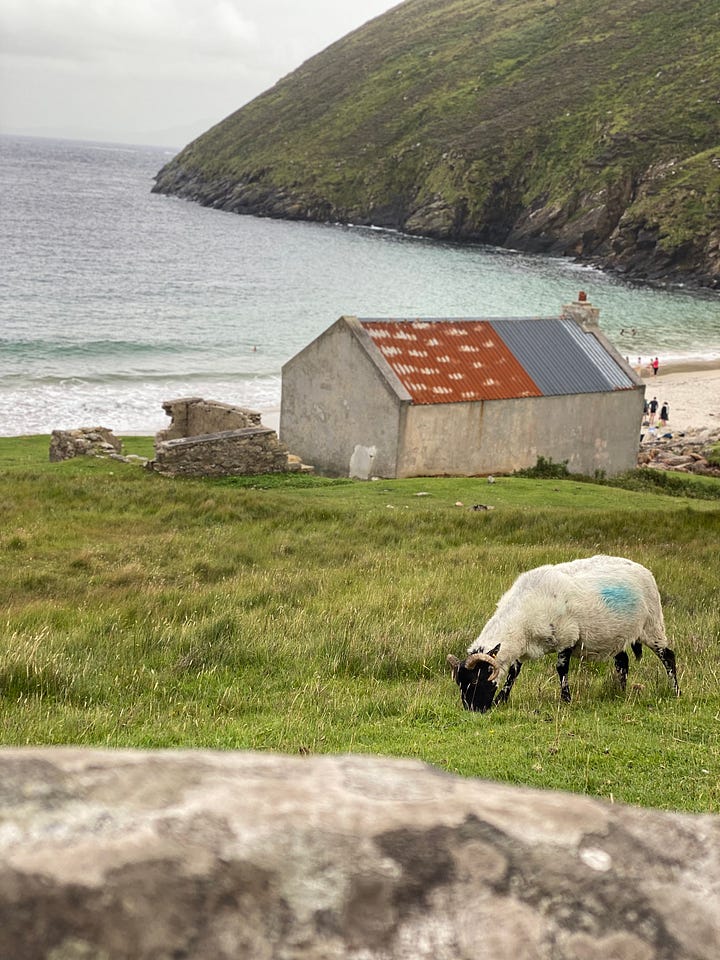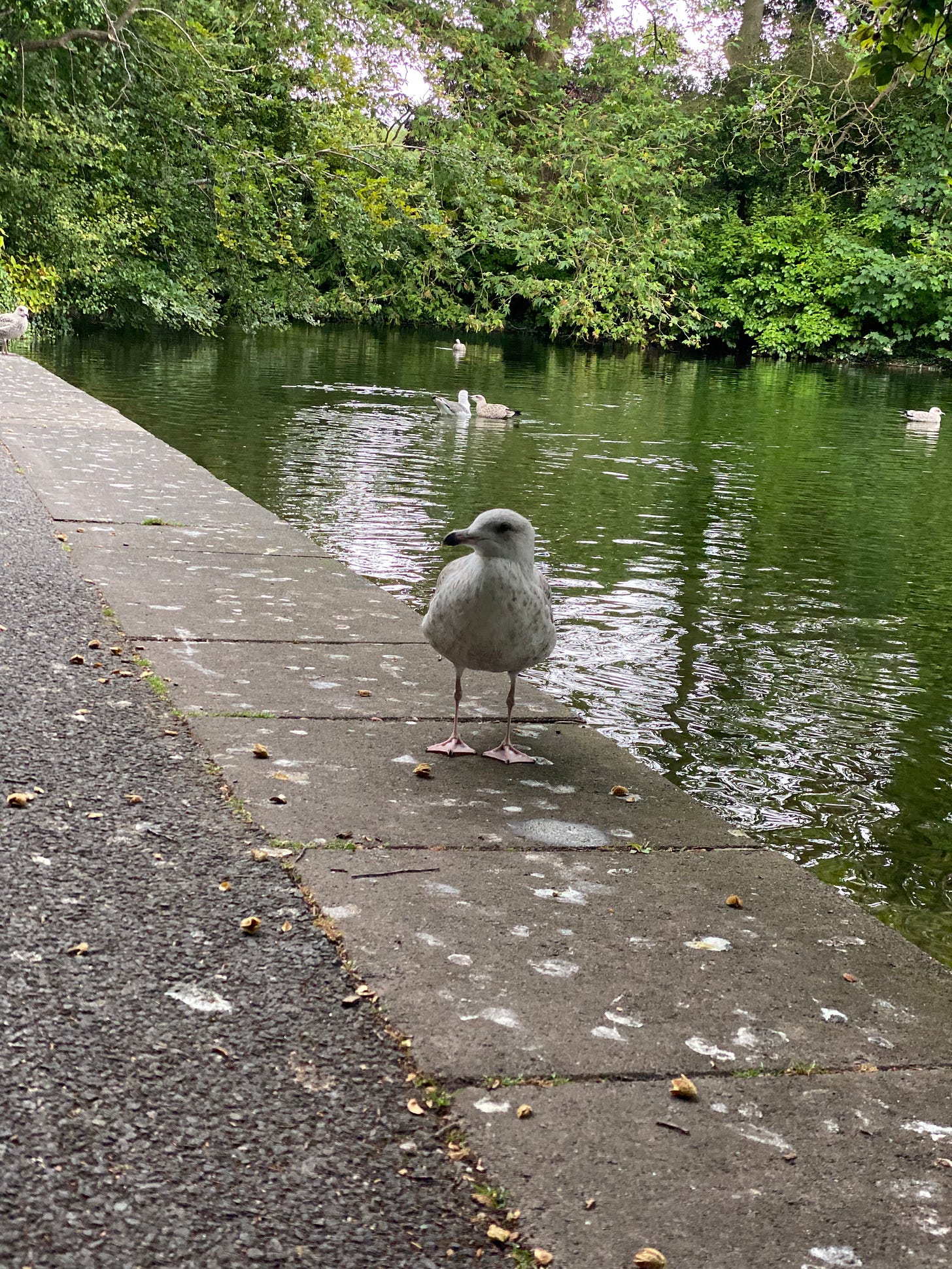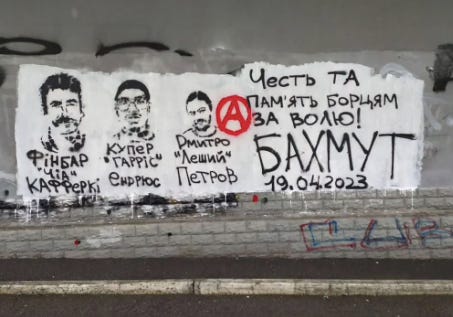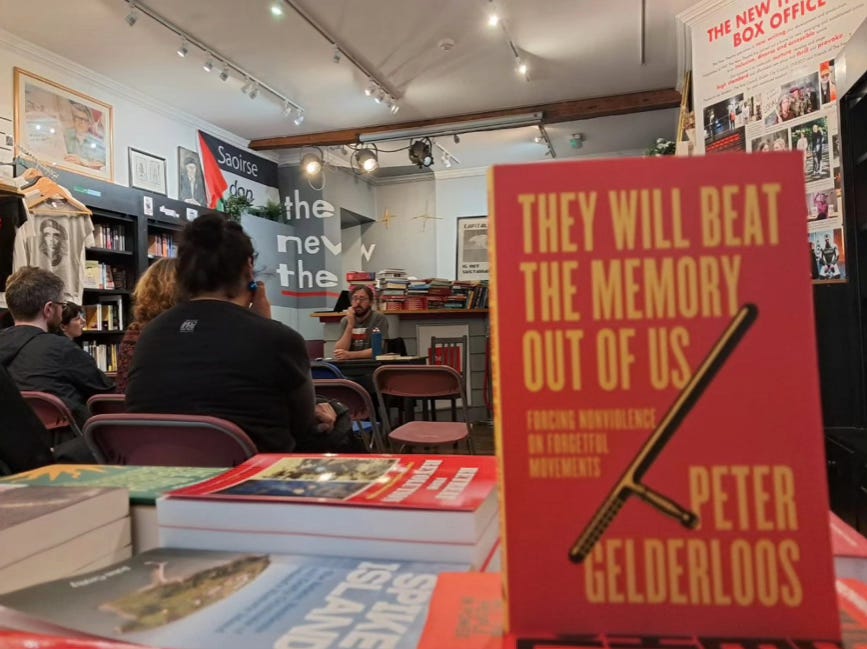the edge of the world & the center of the city
Ireland: a travel diary of ghosts, food, & radical thought
We made it to Ireland with the help of my job. It’s rare for non-tenure track positions to come with many benefits, but my two-year position happens to offer conference travel funding, and I was very happy to be selected to present at the Feminist Spatialities conference in Dublin. Admittedly, we had more in mind for the trip than the conference. Below, some disparate fragments of our week in Ireland.
The Magic & The Mourning (Achill Island)
There are places that feel like the edge of the world. Like portals. On the rocks of the Minaun Heights we are surrounded by wild sheep, yellow-green grass, and sharp winds. The Atlantic Ocean below us rages, like it’s making up for all our trapped and hungry screams, like it knows it’s been too often forced to be a graveyard. We are at the edge of the world here, and Peter pees like he does in nature he finds sacred, and I send a video to Dean because he always sends me videos of beautiful things, and also I talk to the sheep. I say, “I love you sheep,” I say, “I love you land.” I say, thank you.





I had never heard of Achill Island until meeting Orla and her family at our anarchist social center. Orla was from Achill, the west coast of Ireland, and had met her husband hiking the Appalachian Trail. They lived in Cleveland with their two boys and had heard about The Rhizome House in a letter from Orla’s brother, Finbar, who was fighting in Ukraine with the anarchist-aligned front of the struggle against the Russian invasion. Finbar was in a unit with Dmitry, a Russian anarchist, and Cooper, an anarchist from Cleveland (a newer friend to me, a close friend to a lot of my community). In April 2023, Dmitry, Cooper, and Finbar were all killed on a mission trying to protect a vital supply road near Bakhmut. Orla came to Rhizome to learn more about the kind of community her brother was a part of; Orla said, “I understand now that this was his family.” She clarified that of course Finbar’s family was in Achill with the Cafferkey’s, but also it was with the anarchists, all of us across the globe, who hold the same dreams in our hearts as Finbar held in his. Dmitry, Cooper, and Finbar should still be here; but in their absence, inevitably, transformation and connection has blossomed in their wake.
Orla and her family moved back to Achill in the summer and we were invited to spend some time with them, to see where Finbar grew up, to see the memorial garden where Kurdish, Ukrainian, and American comrades have come to pay their respects. There is so much more to say about our time with the family, with the land, but some of it I’d rather keep close to my chest, and some of it isn’t mine to share. But, without question, our time with the family was the highlight of the week.
I will share one more thing now, then, about this aspect, much more again: we discovered that Cleveland is Achill’s “sister city.” During the famine, different regions of Ireland ended up in similar places in the States. Achill families ended up almost entirely in Cleveland because they got work digging the Ohio Erie canal. I dropped my fork when Orla shared this over breakfast our first morning there—I grew up less than a mile away from that same canal. In my memoir, I wrote about the Irish workers who dug it because I always felt so connected to their ghosts. I just had no idea they hailed from Achill specifically, from this home to Finbar who wound up in Eastern Europe with an anarchist from Cleveland. The synchronicities made my hairs stand on end. I feel haunted by these connections….I know in my bones that this isn’t just coincidence. (A thing I like about myself is that I have never been persuaded by secularism to be dismissive of the scaredly profound.)
The Conference (Dublin)
There were some cool people at the conference, but overall it was an underwhelming experience, and that’s all I’ll say about that. I will, however, tell you about my paper, which I think was pretty darn solid.
The title of the paper was “Cartographies of Criminal Sex and Other Lessons in Insurgent Fugitivity.” (Academic titles are ridiculous, but they’re kind of a delight to come up with.) I begin with the true story of a soul food restaurant on 42nd street that was known for being a refuge to sex workers and transwomen in the 70s. During the Ed Koch-led “revitalization” of Times Square, countless businesses and people were driven out, prime among them establishments that catered to low-income “undesirables” and a whole slew of sex shops (peep shows, adult video stores, etc.). Who took over the soul food refuge? Women Against Pornography (WAP), the feminists trying to save women from harm (unless they were the Black, brown, trans, and sex working women they were driving out of a home). This is a symbolic example of the way that misguided feminist sex panics end up serving racist, carceral, capitalist agendas far more than they help anyone.
From there I ask us to move beyond the tired debate of whether sex work is good or bad, and instead to consider sex work as a spatial battleground, and that the workers who navigate this criminalized terrain have so much to teach social movements facing apocalyptic times. Sex workers know about security culture, protecting each other from harm without the cops, mutual aid, and so much more. More and more of us are being criminalized, or at risk of it — trans people and the parents/teachers/doctors who provide them care, pregnant people seeking IVF or life-saving procedures, environmental activists, protestors against genocide, Black and immigrant folks just for existing….There is no more grounds for moralism in a society that deems survival a felony.
It’s unclear how my paper was received —no one asked me questions during the q&a, a first for me at a conference. (Though a few people came to talk to me about it appreciatively afterwards.) I know that Ireland and the UK have more SWERFs in feminist spaces than we do in the states, and Peter noticed at least one woman in the audience specifically not clap when I finished. So…who knows. But I’m proud of this paper, and the argument I’m making is definitely part of the new book project.
The History
Ireland’s history is a potently anticolonial one. The country’s story is rooted in resistance to British empire. Everywhere there are formal landmarks or the feeling of ghosts who will remind you of rebellion. We saw the post office where the Easter Rising battle took place, and various statues of nationalist leaders. I am feeling reflective about how, in the past, I’ve overly romanticized struggle like this—it’s pretty easy to do in Lefty spaces. I’ve shifted quite a bit around this and think more and more about the individual people’s stories—-the wives and children left behind, for example—more than the flattened symbol of the struggle itself. And though I’ll always support and respect oppressed peoples right to resist, moving through the specters of revolution felt more complicated this time.
This statue in St. Stephen’s Green representing the Great Famine was incredibly moving to me. In person, it ached.
The Oscar Wilde statue was even more delightful and sweet than I imagined. It was like a gay sojourn spot, we saw so many gay couples coming and going while we lingered around his impish grin. My mom and grandmother introduced me to Wilde’s work when I was very young and it’s been a pleasure to be a life-long appreciator.
And here is a very good gull from St. Stephen’s Green.

The Food
I am hesitant to share a more traditional travel guide section since, as I wrote in my last piece, the travel industry is extremely harmful and we should all be thinking really critically about how we engage in it. That said, I did indeed travel, which meant I ate food at restaurants. As a former vegan food blogger, I am feeling compelled to rave about a few veg-friendly places. Please know that I know that I know all the things (the covid things, the worker things, the tourism things).
Servd: we were lucky to eat a lot of home cooked food in Achill, but we also had a couple meals just outside Achill, in Westport. I apologize for sharing something kind of cringe/trendy—the lack of ‘e’ in Servd is both embarrassing and also a sign that they probably have great vegan food and a good latte. I was correct on all counts. Awesome avo toast & turmeric oat latte, definitely had at least one fluorescent light lettering sign on the wall.
Brother Hubbard: an excellent breakfast/brunch spot for vegans and omnivores alike. I had an incredible homemade granola, lightly sweet with a hint of thai basil (!), served over vegan yogurt that actually tasted good! I was also on a scone mission the whole week, and I have to say that Brother Hubbard’s vegan scone beat all the other (non-vegan) ones I tried.
Cornucopia: we were both exhausted the day we went to Cornucopia for dinner, and it gave us the perfect low-key, healthy comfort food options. It’s cafeteria style choose-your-own bowl or soup/salad. Fresh ingredients, brown rice, juices, and vegan treats. Places like this always feel really helpful during travel weeks if you need a break from out-of-the-ordinary food—everything here felt like stuff we’d cook at home.
Etto: last but not least. We treated ourselves to one really indulgent meal, per the near-insistence of a friend who could not stop raving about the food here (thanks A!). Etto is a casual eatery with fine dining flavors—the dishes are extremely creative, small portioned, and astounding. I can’t think of a better word than ‘astounding.’---so many bites were followed by wide eyes and happy-confused exclamations. We had a really pleasurable 2+ hours there (they encourage slooow lunch, which I thought we’d lost after leaving Manresa), and I was also feeling really emotional about how far I’ve come from my eating disorder days. It was a meal I simply would not have let myself eat ten years ago. I’m grateful for healing, and grateful to move through life with less fear.



The Memory (Peter’s Book Talk)
Peter had his book launch for They Will Beat the Memory Out of Us at Connolly Books, Ireland’s oldest radical bookstore. He gave a great talk about the ways that our movement history and our collective memory is stolen from us, by the state and also because of flaws in our movement cultures. The result of forgetting the failures and successes of the past — or only remembering the mainstream media’s version of it — means repeating the same fatal mistakes. The stakes are high—the survival of the planet and each other depend on truer remembering. I’ll leave it there and encourage you to buy the book and subscribe to his newsletter where he’ll be writing more on this. (Also: Thanks to the young folks at the talk who took us to a pub and shared their perspectives on current struggles in Ireland; we really enjoyed connecting. <3)
Tell me Ireland things! Have you been there? Are you from there, and if so, what did I miss? Do you want to ask me any questions about my paper (lol)?











We have some distant relatives in Cork and Dingle, I've been dreaming about going back for a visit. Loved reading this and living vicariously through you! And I bet even without getting any questions, your talk (great title btw) planted more than a few seeds.
There’s a museum called Strokestown House that I highly recommend in Roscommon